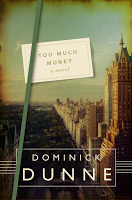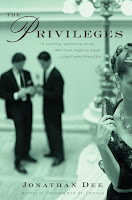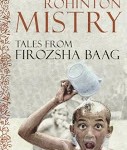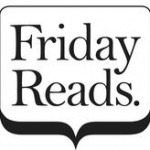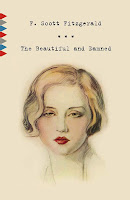 It’s nice to make a bit of progress on a project: I’m moving along mostly on track with my To Be Read Challenge for 2011. July is the 7th month, I’m writing about my 6th book, as long as I don’t fall behind over the summer months, I’m feeling good about reaching my goal. My latest read is The Beautiful and Damned by F. Scott Fitzgerald. The book was largely on my list because of my love for another Fitzgerald work—The Great Gatsby—and I picked it up in July because of my fond memories of ready Gatsby during the summer months.
It’s nice to make a bit of progress on a project: I’m moving along mostly on track with my To Be Read Challenge for 2011. July is the 7th month, I’m writing about my 6th book, as long as I don’t fall behind over the summer months, I’m feeling good about reaching my goal. My latest read is The Beautiful and Damned by F. Scott Fitzgerald. The book was largely on my list because of my love for another Fitzgerald work—The Great Gatsby—and I picked it up in July because of my fond memories of ready Gatsby during the summer months.
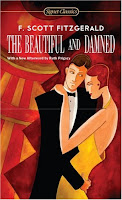 Like The Great Gatsby, The Beautiful and Damned is considered a novel of the Jazz Age of which Fitzgerald himself was a part. The novel follows the lives of Anthony Patch and his wife Gloria over a period of about 10 years through their 20s and 30s. Anthony is the grandson of a rich Wall Street business man and Anthony and Gloria spend the majority of the book drinking and waiting for said grandfather to die so that they may inherit his fortunes. Ironic that I started this post with talk about progress and accomplishment, two things that neither Anthony nor Gloria aspire to. Although they do want wealth, they feel entitled to it: and the book goes to great length to show the reader how they are ruined by this. The epigraph of the book reads: “The victors belong to the spoils”, a clever reordering of the well known phrase to the victors belong the spoils, and a good summation I think of the moral of this book. Anthony and Gloria are owned by their need to consume (both in terms of commercialism but, also, as far as alcohol is concerned anyway, physical consumption as well) and their desire for wealth.
Like The Great Gatsby, The Beautiful and Damned is considered a novel of the Jazz Age of which Fitzgerald himself was a part. The novel follows the lives of Anthony Patch and his wife Gloria over a period of about 10 years through their 20s and 30s. Anthony is the grandson of a rich Wall Street business man and Anthony and Gloria spend the majority of the book drinking and waiting for said grandfather to die so that they may inherit his fortunes. Ironic that I started this post with talk about progress and accomplishment, two things that neither Anthony nor Gloria aspire to. Although they do want wealth, they feel entitled to it: and the book goes to great length to show the reader how they are ruined by this. The epigraph of the book reads: “The victors belong to the spoils”, a clever reordering of the well known phrase to the victors belong the spoils, and a good summation I think of the moral of this book. Anthony and Gloria are owned by their need to consume (both in terms of commercialism but, also, as far as alcohol is concerned anyway, physical consumption as well) and their desire for wealth.
I have written before about how I am a reader for whom character is important, and I think this caused me problems with The Beautiful and Damned; not because the characters are poorly developed, but because they are so unlikable. The book jacket of my edition of this novel (The Modern Library Classics paperback) reads “The Beautiful and Damned is at once a gripping morality tale, a rueful mediation on love, marriage, and money, and an acute social document.” I guess I would mostly agree with that: well, maybe all of it except the “gripping” part. Although I enjoy Fitzgerald’s writing style and I loved the depiction of early 20th Century New York City, my dislike of the main characters eventually left me half-heartedly turning pages.
Further reading for the enthusiastic and not so enthusiastic reader of this book?
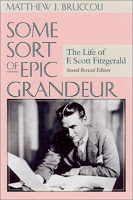 The Beautiful and Damned is said to have taken a lot of inspiration from Fitzgerald’s own life, for confirmation of that, you might turn to something biographical like Some Sort Of Epic Grandeur: the Life of F. Scott Fitzgerald by Matthew J Bruccoli.
The Beautiful and Damned is said to have taken a lot of inspiration from Fitzgerald’s own life, for confirmation of that, you might turn to something biographical like Some Sort Of Epic Grandeur: the Life of F. Scott Fitzgerald by Matthew J Bruccoli.
For more Jazz Age morality tales, I can’t help but feel like a read (or re-read) of The Great Gatsby might be a better way to experience a Fitzgerald fix.
If you want fictional accounts of the rich and entitled of other New York eras there are plenty to choose from: try Bonfire of the Vanities by Tom Wolfe, The Privileges by Jonathan Dee or the not-so-subtly titled Too Much Money by Dominick Dunne.
Source: http://www.thereader.ca/2011/07/tbr-reading-challenge-beautiful-and.html

